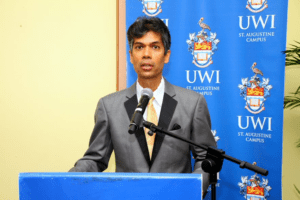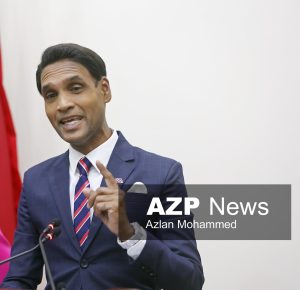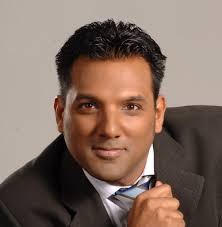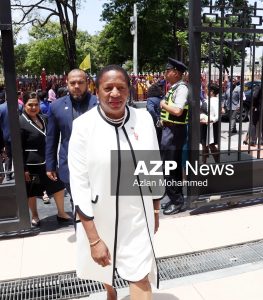‘Citizens of the developing countries need to embark on a social and moral revolution to reverse and curb the continued importation of destructive and exploitative value systems that have gradually eroded traditional family values’

THE developing world needs more positive voices and minds as a medium to transmit a message of understanding and peace. If there is to be positive change, then an entire generation must be radically transformed in its mode of thinking and lifestyle.
There is an urgent need to effectively use the media (radio, internet, television, newspaper and cinema) to promote the positive aspects of peaceful co-existence in ethnically and religiously diverse societies. A simple act of being more tolerant in the workplace, community and home will not only positively influence others but teach children, the next generation, to love and not discriminate in a multicultural setting.
Citizens of the developing countries need to embark on a social and moral revolution to reverse and curb the continued importation of destructive and exploitative value systems that have gradually eroded traditional family values.

These are usually promoted in the media and tend to glorify or promote common-law relationships, infidelity, smoking, alcoholism, domestic violence, homicides, rapes, gambling and pornography. Obviously, democracy is being abused and a nation will suffer when there is a steady flow of unchecked information entering the minds of its citizens, especially the impressionable and younger ones.
It is vital that countries in the Global South monitor and regularly assess the mental health of its citizens. If there is to be beneficial change, then the psyche, philosophy and ethos must be altered and must reflect a new vision.
Indeed, the self-determination and goals of developing countries must not be derailed or distracted by the trivial, harmful and useless cultural and social garbage which obscures the dreams and morality of the youths. Unless there is a plan to purge the media of this entertainment that seems more like electronic garbage and defy the intruders and
marauders then the spiritual values and morals will vanish and educational standards will be diluted. This could be ignore but the backlash is that some will be trapped in a cesspit of underachievers and low standards.
Residents of developing countries are painfully aware that unity does not necessarily mean residing in the same geographical region. This is only one of the prerequisites. In tackling obstacles there is a dire need for cooperation and collective work at the local, regional and national levels. Citizens need to remove their blinders and adopt an open-minded, patriotic, pro- active approach to transform the family, neighbourhood, city, country and region. It is a gradual step-by-step process and unless there is a consensus for positive change, then it is useless to attempt or expect a change in the state of any nation. Persons residing in the rural and urban areas must unite to assist the oppressed, sick and hungry. We all belong to humanity’s quilt and no nation or ethnicity is superior or better than another.
It is essential to empower the poor with skills and initiate schemes to combat rural and urban poverty. Promotion of more grassroots organisations and the development of domestic and sub- regional markets will greatly improve the economic strength and exports of any developing nation. There is now a growing need for expertise to train and advise locals on strategies to boost private and public sector growth.
Past leaders as Hugo Chavez, former president of Venezuela, used profits from the oil industry to assist the poor in his country. But Chavez is confronted with a dilemma.
He was very critical of the United States and accused them of masterminding a coup to overthrow him. However, Chavez allowed the United States oil companies to continue operations in Venezuela. This situation in Venezuela is typical of what occurs in other countries in the South.
If there is to be a radical transformation then the developing countries must acquire the technology to harness and manage their resources and stop depending on the developed world. Indeed developing economies have been indoctrinated to believe that a few countries will always possess a monopoly over technology.
Dr Jerome Teelucksingh is an activist. He initiated the inaugural observances of International Day for the Elimination of Violence Against Men and Boys (January 31) and World Day of the Boy Child (May 16). He has made academic presentations at tertiary institutions including Harvard University and Oxford University.
See other articles by Dr Jerome Teelucksingh on AZP News:
The Law of Supply and Demand in Developing Countries
End the Dependency for Developing Countries
T&T Carnival and the Emperor’s New Clothes
The Influence of Labour on Caribbean Integration
The illusion of political Unity
Presbyterians in Trinidad: Humble Missionaries, Local Workers
Religious Plurality: Curse or Blessing
Caribbean Youth Need Optimism, Patriotism
Rethinking Identities in Caribbean, Latin America
November 19: All Inclusive International Men’s Day
Should International Agencies be Blamed for Unemployment
A Need to Observe Word Unemployment Day
An Ideology for the Trade Union Movement
The Man who Couldn’t be Prime Minister
Social Outburst vs Social Revolution
Challenges of the Men’s Movement
If George Floyd was Denied Parole
The Meaning of Indian Arrival Day in T&T
International Men’s Day – A Way of Life
Wounds that cause school violence
May Day: A Time for Solidarity, Strength
Who Coined the Term ‘Black Power’
The illusion of political Unity
Presbyterians in Trinidad: Humble Missionaries, Local Workers
Religious Plurality: Curse or Blessing
Caribbean Youth Need Optimism, Patriotism
Rethinking Identities in Caribbean, Latin America
November 19: All Inclusive International Men’s Day
Should International Agencies be Blamed for Unemployment
A Need to Observe Word Unemployment Day
An Ideology for the Trade Union Movement
The Man who Couldn’t be Prime Minister
Social Outburst vs Social Revolution
Challenges of the Men’s Movement
If George Floyd was Denied Parole
The Meaning of Indian Arrival Day in T&T
International Men’s Day – A Way of Life
Wounds that cause school violence
May Day: A Time for Solidarity, Strength
Who Coined the Term ‘Black Power’
![]()













